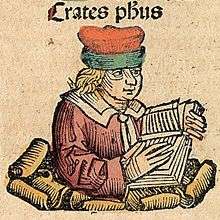Crates of Athens
Crates of Athens (Greek: Κράτης ὁ Ἀθηναῖος; died 268–264 BC)[1] was a Greek philosopher.

Biography
Crates was the son of Antigenes of the Thriasian deme, the pupil and eromenos[2] of Polemo, and his successor as scholarch of the Platonic Academy,[3] in 270/69 BC. The intimate friendship of Crates and Polemo was celebrated in antiquity, and Diogenes Laërtius has preserved an epigram of the poet Antagoras, according to which the two friends were united after death in one tomb.[3] The epigram, according to him, reads:
"Stranger, who passest by, relate that here
The God-like Crates lies, and Polemo;
Two men of kindred nobleness of mind;
Out of whose holy mouths pure wisdom flowed,
And they with upright lives did well display,
The strength of all their principles and teaching." [4]
The most distinguished of the pupils of Crates were the philosopher Arcesilaus, who succeeded him as scholarch, Theodorus the Atheist, and Bion of Borysthenes.[5] The writings of Crates are lost. Diogenes Laërtius says that they were on philosophical subjects, on comedy, and also orations;[5] but the latter were probably written by Crates of Tralles.
Notes
- Dorandi 1999, p. 48.
- "ἐρώμενος Πολέμωνος": Laërtius 1925, § 21
- Laërtius 1925, § 21.
- "Archived copy". Archived from the original on 2007-09-30. Retrieved 2007-03-21.CS1 maint: archived copy as title (link)
- Laërtius 1925, § 23.
References
- Dorandi, Tiziano (1999). "Chapter 2: Chronology". In Algra, Keimpe; et al. (eds.). The Cambridge History of Hellenistic Philosophy. Cambridge: Cambridge University Press. ISBN 9780521250283.CS1 maint: ref=harv (link)

Attribution:
